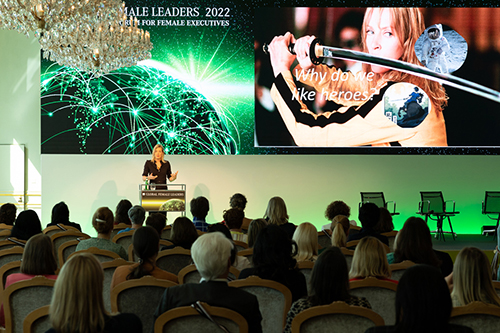
Courageous leadership is needed now to address systemic challenges
We are living in an era of geopolitical fragility. Democratic principles and liberal values are under threat. Maintaining a value-based society requires courage – from all of us.

Every day, we are encouraged to stand up for what is important to us as a society and to speak up when our shared values are infringed. Leaders need to decide what they stand for and what they stand up against. Courage – civil courage – can come in small, unassuming forms. Courage does not have to be loud and roaring to be effective and impactful.
Courage has three components
Courageous leaders are guided by self-transcendent values. These values motivate actions that go beyond one`s own self-interests. Courageous leaders think and act with the greater good in mind, they are generous, seek fairness, and act with respect and integrity. Our heroes embody these values – and we love them regardless of their success or failure, because they stand up for “what is right”.
Perception of risk. Courageous leaders are neither naïve nor reckless. They are aware of the risk and they take failure into account. They are aware that initiating innovation bears risks. Standing up for what is important and standing up against what is wrong, bears a lot of risks. Resisting the majority opinion and daring to think differently is a (civil) courage we need more of.
Lastly, courageous people actively choose to take initiative. To be courageous is to actively decide to act, to resist, to challenge the status quo, to spark creativity and to stand up for your own values. Courageous people decide not to be a victim or be passive.
Courageous people – in formal leadership roles or not – perceive the risks, and they also see what is at stake, and they decide to do something about it.
Courageous leaders are interested in doing well by doing good. With the public demanding a kinder form of capitalism, organizations are being urged to focus on outcomes that are good for society, such as more environmentally friendly production or higher employment. Surmounting these problems will require leaders to balance collective interests with their own corporate aims.
Research Information & Knowledge Hub for additional information on IMD publications
The B case outlines how, by early 2025, Isabella Phoenix's initial vision for HP's Amplify Impact sustainability program had grown into a global initiative involving 4,800 partners in 48 countries. The program surpassed its goals, enrolling 59 of ...
The A case in this two-part series outlines the challenges Isabella Phoenix faced in designing a global sustainability program for HP's vast network of channel partners in just 12 weeks with only one team member and limited resources. The initiati...
Les études de cas de HBR sont basées sur des problèmes vécus par des dirigeants d’entreprise et proposent des solutions d’experts. Celle-ci est tirée de l’étude de cas de l’Insead « Stress and the City (A&B) : Antonio Horta-Osorio, CEO of Lloyds B...
Despite geopolitical upheavals that threaten global growth, companies continue to see business opportunities across borders. As leaders strategize how to position their operations amid war, trade disputes, disease outbreaks, and climate change, ha...
Last week, a notification flashed. “Add your email address for extra security,” my phone chirped. It was from WhatsApp. I stared at the screen, a single question forming in my mind: Security? Or surveillance? I tapped “No.” The feeling wasn’t ange...
Research Information & Knowledge Hub for additional information on IMD publications
Case reference: IMD-2681 ©2025
Research Information & Knowledge Hub for additional information on IMD publications
Research Information & Knowledge Hub for additional information on IMD publications
Research Information & Knowledge Hub for additional information on IMD publications
in I by IMD Brain Circuits 8 July 2025
Research Information & Knowledge Hub for additional information on IMD publications
in I by IMD
Research Information & Knowledge Hub for additional information on IMD publications
in I by IMD
Research Information & Knowledge Hub for additional information on IMD publications
Research Information & Knowledge Hub for additional information on IMD publications
Research Information & Knowledge Hub for additional information on IMD publications
Research Information & Knowledge Hub for additional information on IMD publications





